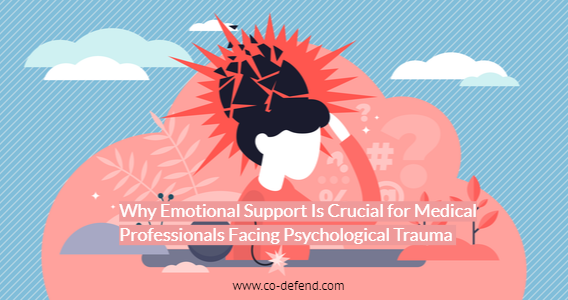Healthcare professionals are experiencing profound psychological trauma during this pandemic. Recent surveys of medical workers in China, Canada, and Italy who treated COVID-19 patients found significantly high rates of anxiety, depression, and insomnia. The World Health Organization in a recent report about the pandemic’s impact on mental health highlighted that healthcare workers are as vulnerable as patients.
With the highest number of COVID-related deaths in the world, U.S. healthcare professionals on the front lines are exhausted and frightened. In such a crisis, physicians and other medical professionals not just need PPE bus also emotional support.
Burnout, Trauma & PTSD Among Medical Workers
Medical experts have defined COVID-19 as a multi-organ disease that can affect the body from head to toe. While treating patients with such diverse and often unpredictable conditions, physicians and other medical workers are overwhelmed. The death, uncertainty, and patients’ struggle take a heavy mental toll on the front-line workers. They also experience the helplessness of families and loved ones. Such experiences could trigger a sense of powerlessness among physicians.
Such environments make healthcare workers more susceptible to post-traumatic stress, mental health experts say. While medical administrators are focused on ensuring supplies with personal protective equipment manufacturers, physicians’ mental health could often get overlooked.
Emotional Support & Therapy
Medical workers are being celebrated as front-line warriors and heroes worldwide. But what they need most amid this crisis is emotional support and a safe working environment in health care facilities. Personal protective equipment and medical supplies are crucial. But ensuring their mental well-being is as important. Psychologists believe that even when the rates of new COVID-19 cases and death begin to reduce the trauma of medical workers is likely to continue. Therapists specializing in treating trauma are offering free sessions to medical workers nationwide.
Medical administrators and policymakers need to provide medical workers with emotional personal protective equipment. These may include, among other things, ensuring timely compensation, incentives, and other rewards. Communities also need to deal with their attitude toward healthcare professionals. We have read and heard incidents of communities turning away healthcare workers due to fear of contracting the virus. This kind of behavior makes it even harder for medical professionals to deal with the crisis.
Specialized Trauma Therapy for Front-line Workers
Health care workers need specialized trauma therapy so they can averse the long-term damaging effects of the pandemic-induced trauma. This will also help depleted professionals to overcome the trauma so they can continue doing their job with efficiency.
The Fairfield County Trauma Response Team, for instance, has been treating dozens of emergency medical technicians, doctors, and nurses. The group was founded by psychologist Karen Alter-Reid. The distinguishing characteristic of a pandemic-induced trauma is that no one knows when it will end, Alter-Reid says. Medical professionals the much-needed contact with the family. Health care workers are used to hugs, backslaps, and sharing beers after a rough shift. Now, these things have become all but impossible due to safety measures.
Dr. Alter-Reid’s trauma response team has been able to help some professionals regain stability through Zoom group therapy. In such therapy sessions, medical workers share their struggles with each other via a computer screen. They talk about the experience of, among other things, living away from families to keep them safe.
Final Thoughts
The widespread burnout and suicide among health care professionals are being studied widely. For example, a group of psychologists explored the impact of the pandemic in the West Coast’s medical system. Most findings indicate medical professionals’ psychological trauma during this worst health crisis of the century. Government officials and hospital leaders need to create a culture of emotional support that enables medical workers to deal with the psychological toll. At Co-Defend, one of the leading bulk PPE suppliers in the USA, we are always committed to helping healthcare professionals by ensuring their safety.
FAQs
Q. What is emotional and psychological trauma?
Emotional and psychological trauma are usually triggered by extraordinarily stressful events. Such events can shake your sense of security, making you feel helpless. Psychological trauma can leave you struggling with upsetting emotions, memories, and anxiety that might not go away for a long time.
Q. What is burnout in the medical field?
Burnout is a long-term stress reaction marked by emotional exhaustion, depersonalization, and a lack of sense of personal accomplishment. The health care environment can put physicians and other medical professionals at a high risk of burnout.
Q. What profession has the highest rate of PTSD?
Medical professionals have the highest rate of post-traumatic stress disorder. Nurses in intensive-care units and mental health care have been shown to have high rates of PTSD symptoms.
